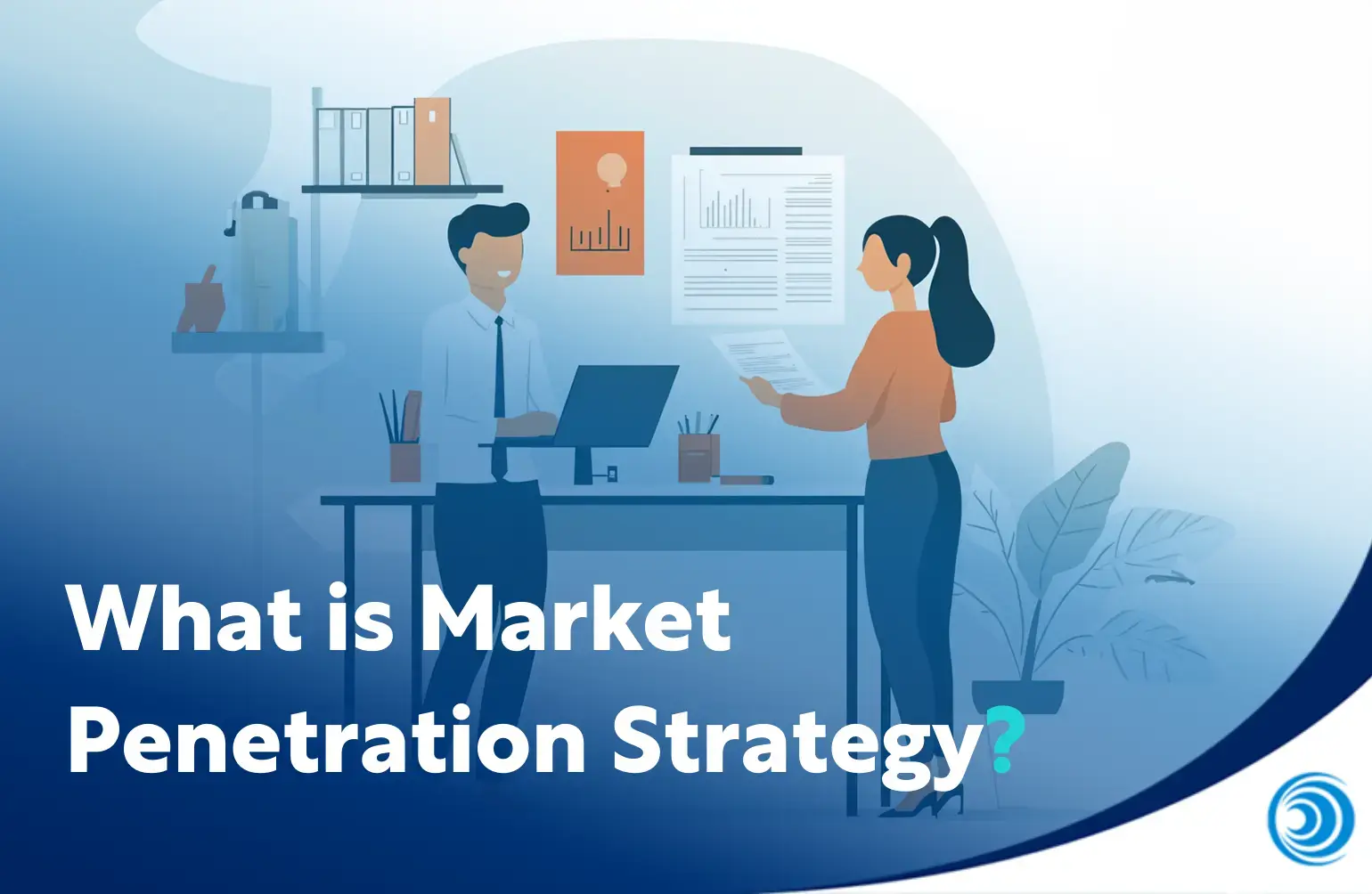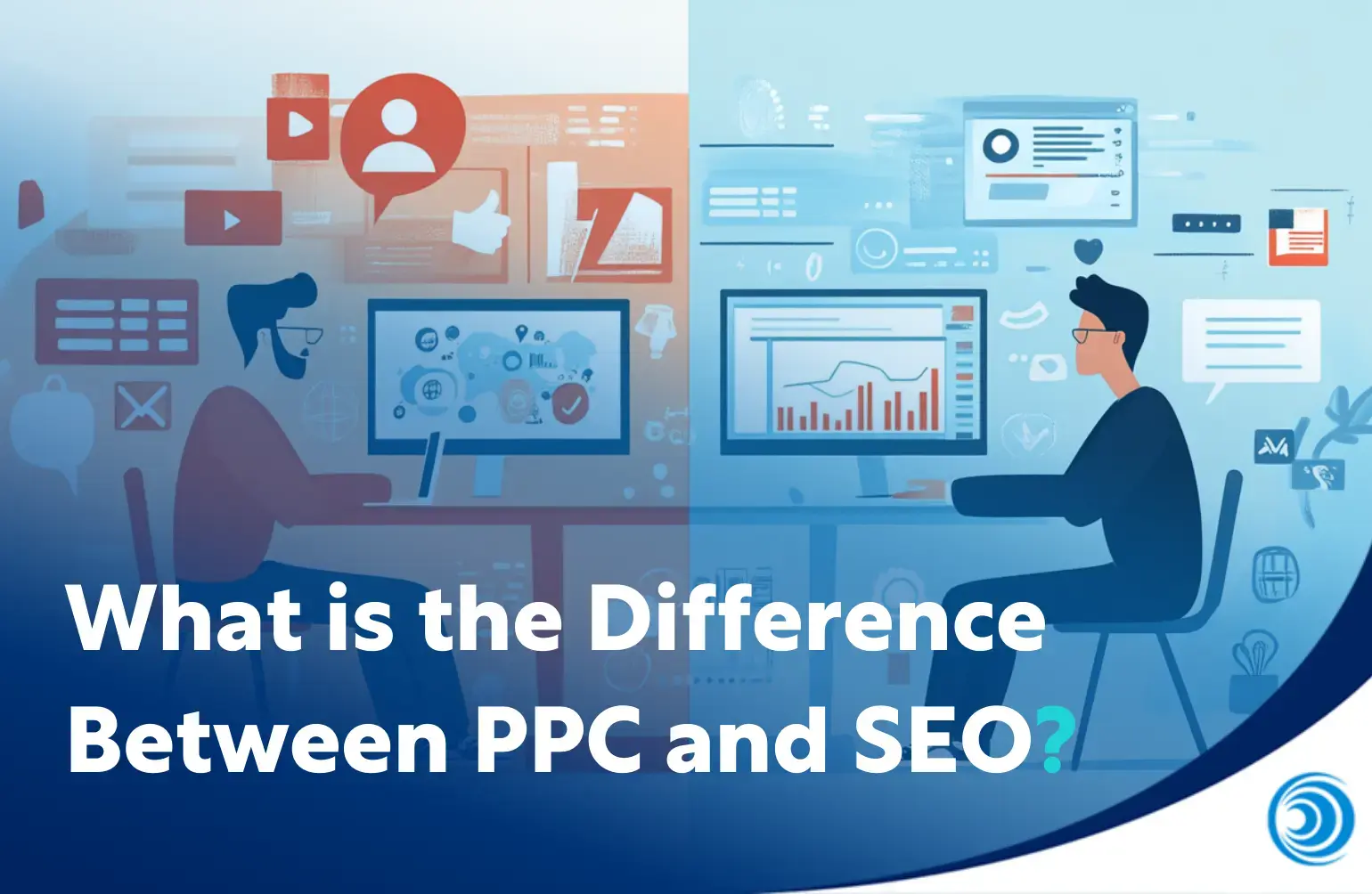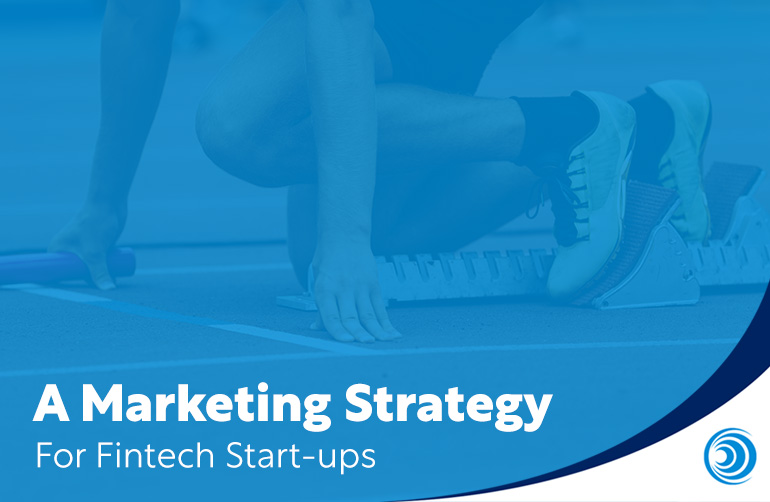
Marketing Strategy for Fintech Start-ups
Like other startups, fintech startups must pass through a difficult adolescent phase.
Flush with investment and innovation, they go out into the market. But if they aren't careful, they can be vulnerable to short-sighted thinking and marketing tactics.
A marketing strategy for fintech startups needs to account for this.
Let's take a deep dive into the many benefits of having a great fintech marketing strategy, what a full fintech marketing team and strategy entails, and the risks of not having one.
What is the adolescant phase of businesses?
The adolescent stage is a critical phase in organization's lifecycles, where they experience significant growth and development but still need to establish a structure to manage it.
This phase is characterised by experimentation, increased autonomy, and the need for more control.
It can also be a challenging time. As feedback from market forces bears down on companies, adaption - and the change it brings with it - accelerates.
Successful navigation of this stage sets the foundation for fintech companies' long-term sustainability. And a good fintech marketing strategy is a crucial part of this puzzle.
What is a fintech marketing strategy?
A fintech marketing strategy is a fintech-specific strategy for marketing to potential fintech customers.
It helps companies in the fintech industry achieve their gain visibility and ultimately leads. It provides an over-arching vision, principles and framework for messaging, audience targeting, and other business objectives.
Having a marketing strategy is key to your business' growth and development.
As part of your fintech marketing strategy, it is crucial that you:
-
Get your branding and messaging right
-
Create a core content plan
-
Integrate inbound marketing channels
-
Review, update, and repeat
The benefits of a marketing strategy for fintech start-ups
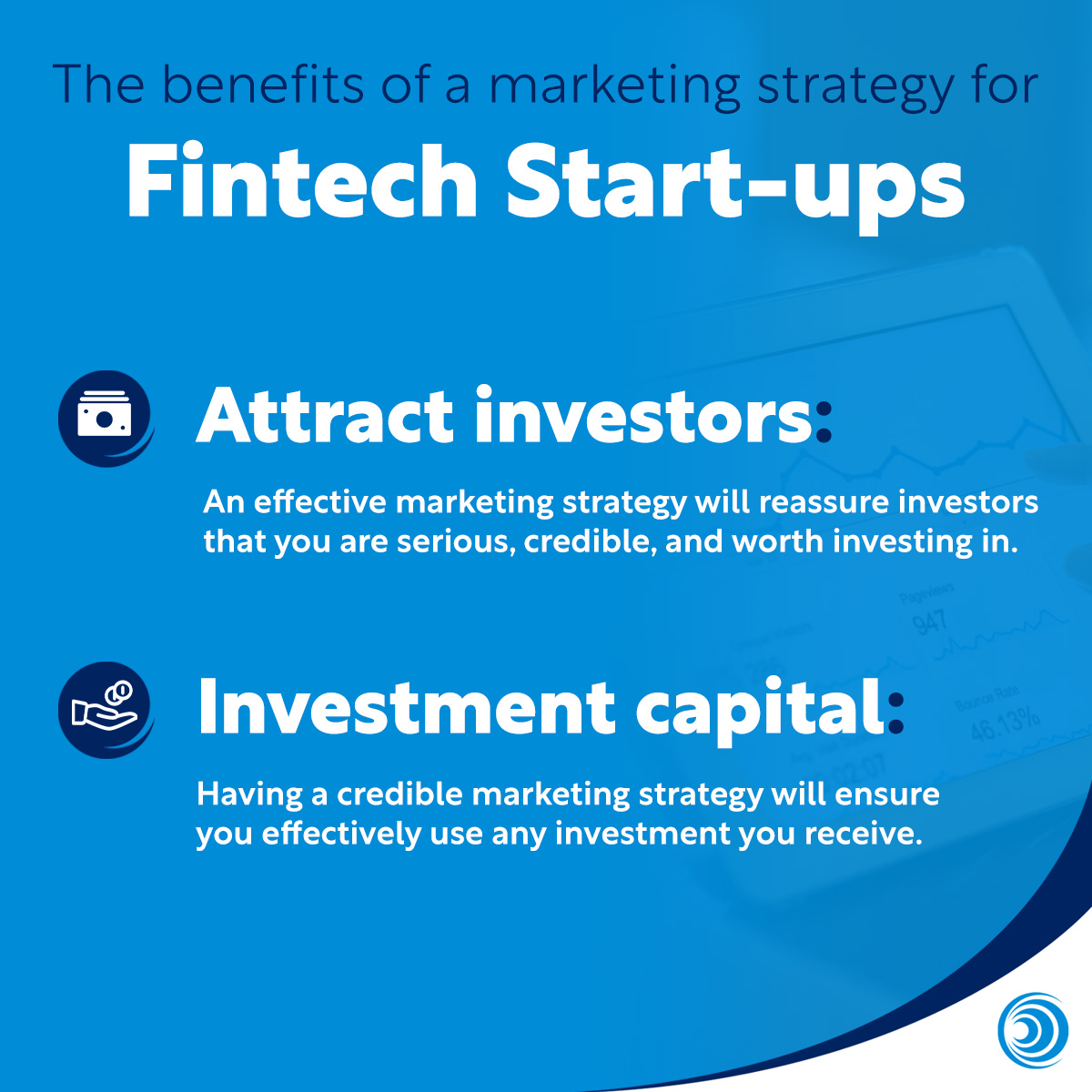
One of the most critical reasons to get your marketing strategy right is that it should enable fintech start-ups to survive the early stages of development. Without it, the expectations of the management team are too high and unfocused.
Below are just a couple of the many benefits to having an effective marketing strategy:
1. Attract investors
An effective marketing strategy will reassure investors that you are serious, credible, and worth investing in.
Conduct a SWOT Analysis (strengths, weaknesses, opportunities, threats) and identify what your USP (Unique Selling Proposition) is to help make your business more appealing.
As soon as you’ve identified your strengths and USPs, ensure they’re conveyed throughout your marketing efforts. Make sure your business has an integrated marketing strategy through social media and your website so investors can see that your business is strong and, most importantly, customers can find your service.
Why not try creating investor-focused marketing materials?
Target potential investors by making an investor deck and by writing, and practicing, your elevator pitch.
Partner with your sales team on a one-page company overview (sales sheet), that includes all the main selling points for your investors.
Potential investors will expect to see that you have a solid marketing strategy as part of your business plan, so make sure you have one.
It will give investors’ confidence that you will make the best use of their investment and not waste it in an excitable frenzy of spending.
2. Uses investment capital wisely
Having a credible marketing strategy will ensure you effectively use any investment that you receive.
Your marketing strategy should have spelt out the market you are focusing on in detail and the type of tactics you will use.
That legwork will be very helpful in your decision-making post investment, as you will have context for evaluating specific opportunities, enabling you to say yes (and no) to spending money.
It is important that fintech start-ups plan in advance, allowing them to get better deals on events and awards, for example.
The flagship payments industry event, Money20/20 will initially offer early bird lower price tickets. Closer to the date of the event, the tickets will surge in price.
This is common amongst many events in the industry.
So, if you’re planning on exhibiting, sponsoring, or even attending an event, planning in advance will give you a better chance at negotiating with event organisers.
Event attendance and award submissions are crucial to elevating your profile in the industry – they are essential aspects of your fintech marketing strategy.
Make sure you evaluate award opportunities that will help build your credibility not only in the fintech industry, but also in the verticals in which your customers operate.
The risks of choosing the wrong fintech marketing strategy
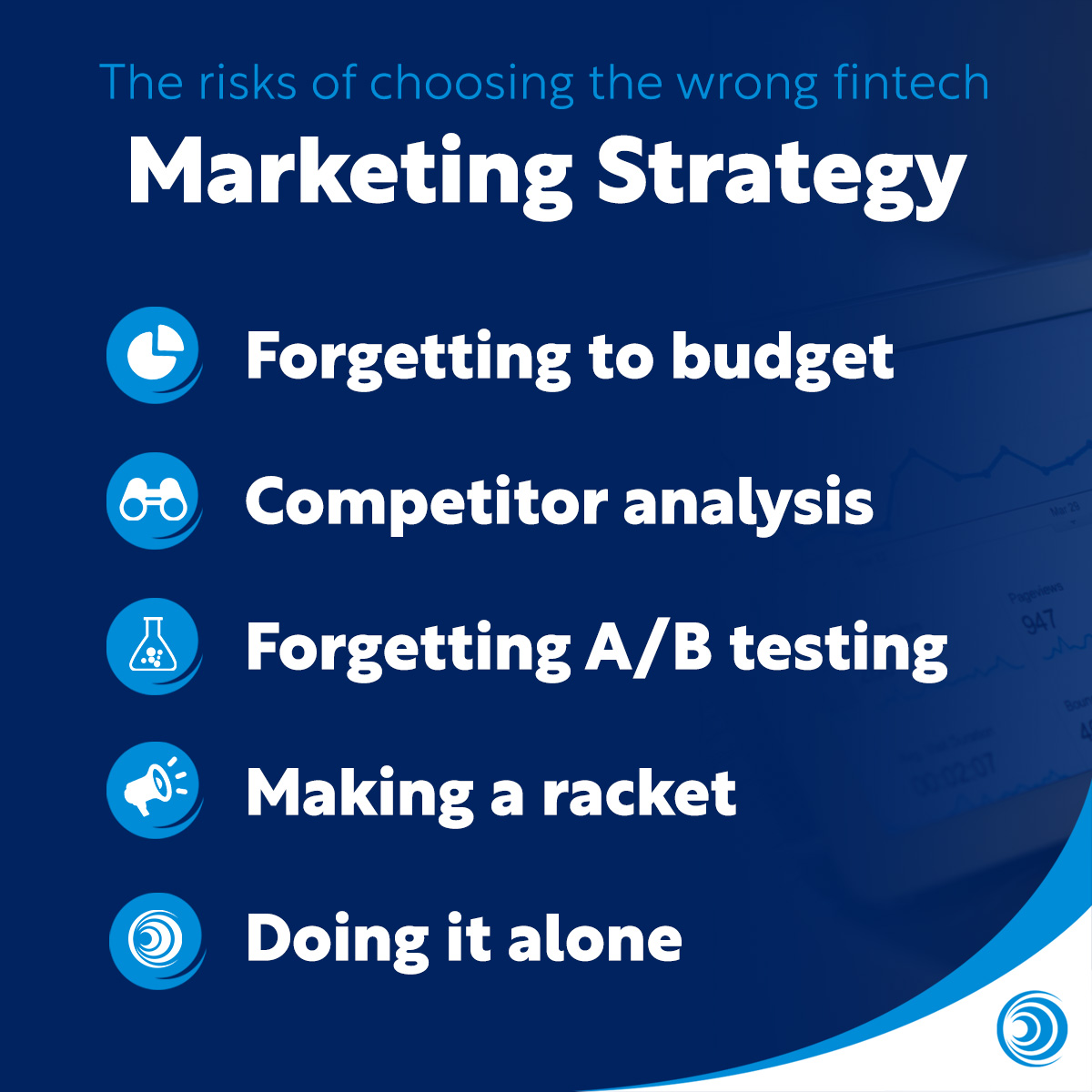
One of the most critical reasons to get your marketing strategy right is that it should enable fintech start-ups to survive the early stages of development. Without it, the expectations of the management team are too high and unfocused.
Below are just a couple of the many benefits to having an effective marketing strategy:
1. Attract investors
An effective marketing strategy will reassure investors that you are serious, credible, and worth investing in.
Conduct a SWOT Analysis (strengths, weaknesses, opportunities, threats) and identify what your USP (Unique Selling Proposition) is to help make your business more appealing.
As soon as you've identified your strengths and USPs, ensure they're conveyed throughout your marketing efforts.
Make sure your business has an integrated marketing strategy through social media and your website so investors can see that your business is strong and, most importantly, that new customers can find your service.
Create investor-focused marketing materials
Target potential investors by making an investor deck and by writing, and practicing, your elevator pitch.
Partner with your sales team on a one-page company overview (sales sheet), that includes all the main selling points for your investors.
Potential investors will expect to see that you have a solid marketing strategy as part of your business plan, so make sure you have one.
It will give investors' confidence that you will make the best use of their investment and not waste it in an excitable frenzy of spending.
2. Use investment capital wisely
Having a credible marketing strategy will ensure you effectively use any investment that you receive.
Your marketing strategy should have spelt out the market you are focusing on in detail and the type of marketing tactics you will use.
That legwork will be very helpful in your decision-making post investment, as you will have context for evaluating specific opportunities, enabling you to say yes (and no) to spending money.
The importance of event marketing efforts
It is important that fintech start-ups plan in advance, allowing them to get better deals on events and awards, for example.
The flagship payments industry event, Money20/20 will initially offer early bird lower price tickets. Closer to the date of the event, the tickets will surge in price.
This is common amongst many events in the industry.
So, if you're planning on exhibiting, sponsoring, or even attending an event, planning in advance will give you a better chance at negotiating with event organisers.
Event attendance and award submissions are crucial to elevating your profile in the industry – they are essential aspects of your fintech marketing strategy.
Make sure you evaluate award opportunities that will help build your credibility not only in the fintech industry, but also in the verticals in which your customers operate.
7 key fintech marketing strategies for start-ups
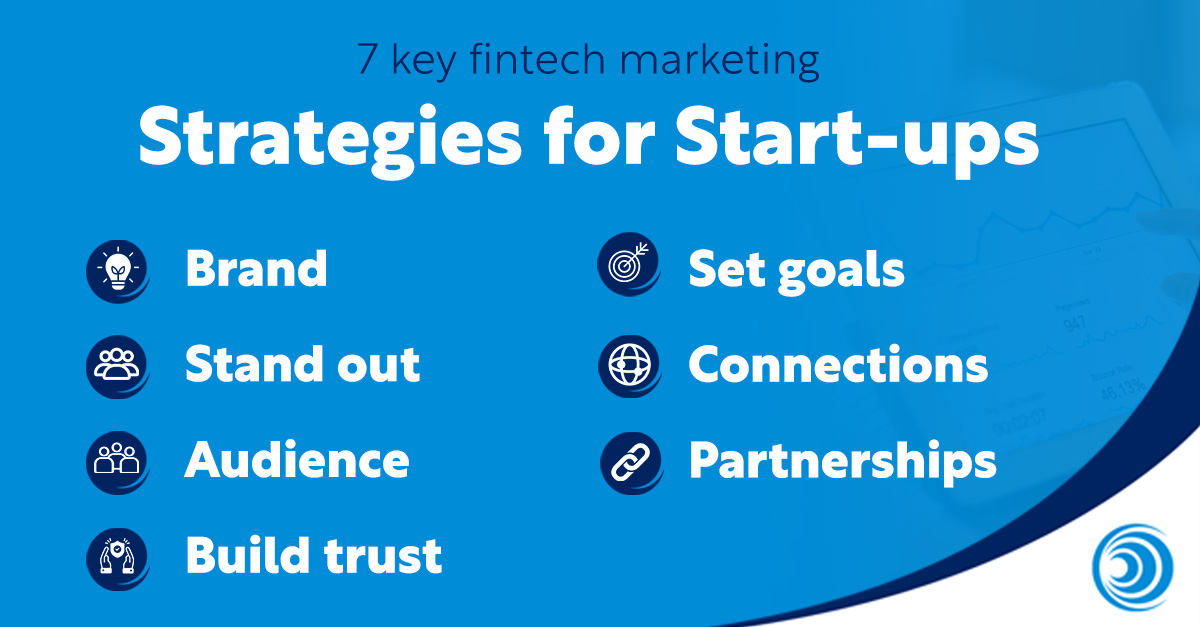
1. Get your brand right
When launching your fintech start-up, the first thing you should be thinking about is your brand.
It's the core of every business.
Think about what is meaningful to both you and your brand. It can help shape the brand values, mission, and vision of your start-up.
Once those are identified, you can work on your visual identity (logos, brand colours, guidelines) and messaging. It's important that these reflect your brand's ethics and values.
Visual identity is a key brand differentiator for your customers. For example, having a signature colour can help increase brand recognition by 80%.
Make your brand distinct
Once you have conducted research on your competitors, complete an audit and compare your capabilities to see which sets you apart from them.
Whether it be that you provide a better user experience or customer service, it's important that you bring those qualities to the forefront of your marketing campaign.
2. Know your audience
Your target audience will always determine your marketing strategy and approach.
You need to create fintech content that will engage them.
While marketing for B2B has always been considered more factually orientated due to its more formal decision-making process, this unwritten rule is less hard and fast as it once was.
In fintech, the decision-making process can be less rigid, allowing for more emotional elements to be bought into the marketing.
Social media marketing
LinkedIn remains the go-to channel to reach decision-makers in the B2B realm.
But as the distinction between B2B and B2C marketing is deteriorating, many marketers acknowledge that buyers are also consumers too so they can be reached through other channels that were previously considered strictly B2C (e.g., TikTok and Instagram).
Depending on what demographics and geographies you are trying to target, you may want to use a different platform.
Recently, NatWest has been targeting Gen Z via its TikTok ‘Business Builder' campaign. Its goal is to target young entrepreneurs.
If you're a start-up that works in both the B2B and B2C space, you may have to embark on two different marketing strategies.
3. Display authenticity to build trust
Research indicates that 88% of consumers say authenticity is important when deciding what brands they like and support. For fintech marketers, that means it's important you build a rapport with your consumers.
If you provide financial services as a B2C offering, encourage your customers to leave reviews of your product through social media posts and email marketing campaigns.
Having positive reviews on platforms likes of Google ReviewsTrustpilot can help you build trust amongst your target market. A whopping 93% of consumers say that online reviews influence their purchase decisions
This doesn't just apply to B2C businesses. 92% of buyers are more likely to purchase after reading a trusted review
Hiring a PR agency can also be beneficial for both B2B and consumer markets. They can help build your start-ups profile and build trust. Gaining PR coverage is valuable in legitimising a new product or service offering.
Industry awards can also be very valuable. Gather data and proof points of your businesses many achievements and compile an award entry for a flagship fintech or payments award.
Just getting shortlisted will help boost your profile, while a win is something you can leverage for a good year or more.
Using similar tactics, partner with a client or customer on a case study. This can help increase your brand exposure among many sectors that may be looking for your products or services.
As part of your marketing strategy, make sure your case studies and testimonials are aligned with the USPs identified in your audit.
4. Scale your marketing
Focus on marketing methods that will help you scale long-term, not just accelerate your short-term growth.
Make sure you allocate a marketing budget that is aligned with the financial performance goals.
As a rule of thumb, B2B companies should spend between 2 and 5% of their annual revenue on marketing. For B2C companies this is slightly higher at 5 and 10%
5. Set - and adjust - strategic goals
As you gather data from your marketing activities, use these insights to tweak your goals and strategy to suit your current market positioning.
In our experience, fintechs often launch with initial messaging that is outdated within around 18 months.
Revisit your website on a regular basis to ensure that its copy and imagery reflects your current messaging and value proposition. Update it if it doesn't.
Continuous change and development are a sign of success. If you aren't regularly updating your marketing strategy, you probably aren't paying it enough attention.
6. Use your connections
A new start-up needs all the profile that they can get, so make sure you take advantage of organic networking opportunities.
Leverage your connections with founders, friends, and colleagues to make yourself known in the industry and build partnerships.
This is likely to bring many benefits. It will of course help build industry profile, but you may also unearth industry insights that could be of value.
It can also help you attract talent, allowing you to expand your business.
7. Build partnerships
The fintech and payments industry is a partnership ecosystem. Build partnerships with key industry players and professionals that can help your business flourish.
Similarly, as a marketing agency, we partner and work effectively with a PR agency. This arrangement allows us to make sure there is continuity between marketing and PR messages, so we work together to boost our clients' brand exposure.
Example of great fintech start-up marketing
A fantastic example of a fintech company using start-up marketing strategy is Coinbase's affiliate programme.

They kickstarted a referral programme to encourage users to promote their product to their networks, as part of their go-to-market strategy.
For each referral that successfully converts to a client and/or initiates a buy or sell of $100 in the first 180 days of opening their account, Coinbase pays a $10 bonus to both the referee and the referrer.
The commission attracted crypto bloggers and influencers who soon started to spread the word and promote Coinbase on their social media channels.
After they successfully raised $75 million in an initial Series C funding round, Coinbase even raised the referral commission to $75 for a limited period – increasing further interest around the brand.
Conclusion
Startups soon move into the adolescent stage of business. It is characterised by growth, experimentation, increased autonomy, and the need for control.
Planting the seeds of long-term sustainability during this period important. Devising a successful fintech marketing strategy is a big part of this.
Startups' fintech marketing strategies should focus on branding, messaging, and audience targeting. And they must be adaptable as newfound pressure from market feedback increases.
An effective marketing strategy can attract investors and ensure the wise use of investment capital.
Event marketing efforts are important for elevating a company's profile in the industry, and advance planning can help secure better deals on events and awards.
Budget management, competitor analysis, A/B testing, and managing publicity levels need to be considered by all fintech companies.
A well-executed marketing strategy can help startups survive early developmental stages and achieve sustainable growth.


